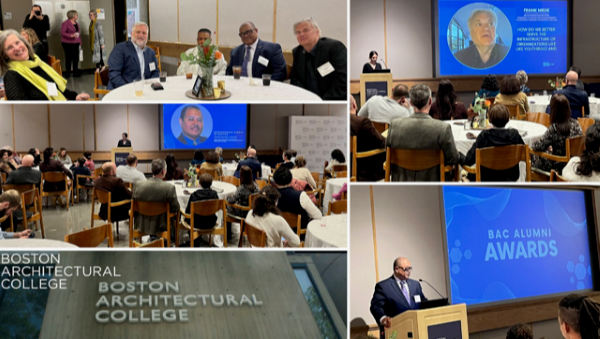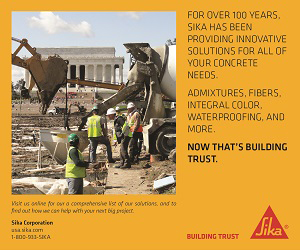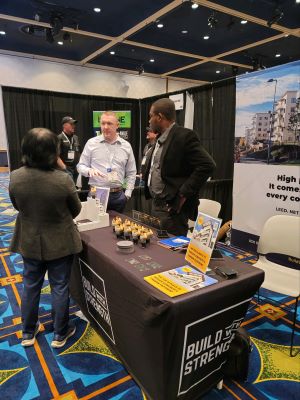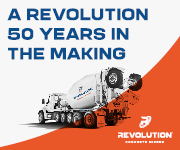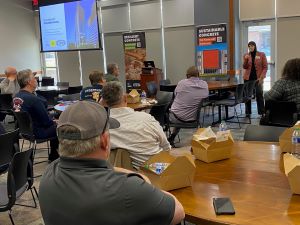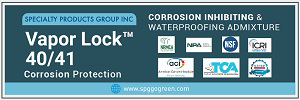 |
||||||||||||||||
|
||||||||||||||||
|
Association & Industry News
NRMCA’s Concrete Cares Award celebrates Producer members’ dedication to supporting their local communities through a wide range of charitable endeavors. If your ready mix company gives back to your community, please let us know. Winning companies receive a donation to the nonprofit organization of their choice and NRMCA will also feature your work on NRMCA social media outlets throughout 2024. Click here for the nomination form; you may nominate your own or another company. For more information, contact Alex Land at aland@nrmca.org.
On Wednesday, November 8, NRMCA Senior Director, Building Innovations, Frank Mruk presented at the Boston Architectural College’s (BAC) Alumni Awards Event in support of BAC alumnus Tony Ransom who received an alumni award. Mr. Ransom is a New England leader of the National Organization of Minority Architects, the American Institute of Architects, the Massachusetts Division of Capital Asset Management and Maintenance, and the Boston Center for Smart Building Technology where Mruk served as past executive director. “Tony Ransom's exemplary accomplishments, service and commitment have brought credit to his community, his profession and to the BAC. Boston and the world is truly a better place due to his efforts,” said Mruk during the presentation. And on Monday, November 13, Mruk was in neighboring Connecticut to present concrete decarbonization strategies to Dr. Michael Cohen's engineering class at the University of Connecticut in Storrs. The Build With Strength program is a leader in supporting New England architects and educators at the cutting edge of industry best practice. For more information, contact Frank Mruk at fmruk@nrmca.org. Engineering
The Fall 2023 newsletter of the National Concrete Consortium includes the following items: • PEM Evolution: Then and Now: The Fall 2023 NC² Moving Advancements into Practice (MAP) Brief from the NC² Resource Library provides a background on the Performance-Engineered Mixtures (PEM) initiative; outlines the accomplishments, key findings and implementation of TPF-5(368); and provides a look at what is current with PEM regarding construction practices. • Optimizing Concrete Pavement Opening to Traffic: This technical summary reviews current practices used to open new pavement surfaces to traffic and how opening to traffic can be accelerated when necessary. The topics covered in this technical summary include planning and contracting considerations, pavement strength development, traffic loading, pavement stresses, early-age concrete pavement fatigue damage, and materials and construction considerations for early opening of concrete pavements. Nondestructive testing applications for determining when concrete pavements can be opened to traffic are also discussed. Additionally, case studies from Iowa, Georgia, Ohio, California, Virginia and Indiana are presented. • Enhancing Performance with Internally Cured Concrete (EPIC2): Featured in the August EDC News Biweekly Newsletter, this article describes an evaluation of the use of internally cured concrete on three bridge deck projects in Idaho and Georgia to minimize shrinkage and other cracking. After more than two and a half years in service, the featured bridge decks with internally cured concrete are performing very well at minimal additional costs (0.7%). • Field Monitoring of Wicking Geotextile for Moisture Reduction in Pavements: A wicking geotextile product available on the market has been proven effective in removing water under both saturated and unsaturated conditions in limited laboratory tests and field projects. While most previous studies have used the product in unpaved and asphalt paved roads, this project evaluated its effectiveness for concrete pavement applications. • New Additives Could Turn Concrete into an Effective Carbon Sink: A team at MIT has discovered that introducing sodium bicarbonate (baking soda) into concrete could significantly reduce concrete's carbon footprint without altering its bulk mechanical properties. Laboratory tests have demonstrated that up to 15 percent of the total amount of carbon dioxide associated with cement production could be mineralized. This new discovery suggests an optimistic future for the development of carbon neutral construction materials. The MIT team is continuing to research the durability impacts of adding sodium bicarbonate to concrete mixes. Click here to access links to each of the above reports.
The National Council of Structural Engineering Associations (NCSEA) recently hosted its annual structural engineering summit in Anaheim, CA. Because structural engineers are the direct specifiers of concrete materials, Build With Strength (BWS) continues to prioritize collaboration with them by offering educational and design assistance resources, said NRMCA Director, Building Innovations, Brandon Wray who attended the event (seen here at center in light shirt) with his colleagues Tiffany Reed-Villarreal and Julian Mills-Beale. BWS exhibited and sponsored the Summit in order to connect with the 950 designer attendees, making them aware of where the ready mixed concrete industry is now and is headed. The event had a strong emphasis on the need for resilient considerations in design beyond standard life safety measures as well as the alignment of sustainably-minded design decisions. Following the event, Wray noted that “sustainability and resiliency are inextricably connected and are both vital in ensuring design decisions yield efficient projects.” In a continual effort to represent the ready mixed concrete industry, Build With Strength acts as a consulting resource for designers when integrating resilient and sustainable concrete strategies into projects nationwide. For more information, contact Brandon Wray at bwray@nrmca.org. Buildings
Last week, Build With Strength partnered with the Minnesota Concrete Council (MCC), to highlight the ready mixed concrete industry's support for Humanity for Humanity chapters throughout the Midwest. More than 90 attendees at the annual AIA Minnesota Conference on Architecture heard panel members describe efforts to demonstrate the long-term value and ownership benefits that strong, durable concrete can provide.
For more information, contact Donn Thompson at dthompson@nrmca.org.
NRMCA presented on Fundamentals of Concrete Construction and Fire Safety at the Kansas City Metro International Code Council (ICC) Chapter Seminar on November 15 in Overland Park, KS, reports NRMCA Senior Vice President, Codes and Standards, Shamim Rashid-Sumar. In addition to Kansas City Metro ICC Chapter members, participants included members of the Kansas Fire Marshals Association, Missouri Fire Marshals Association and the Johnson County Code Officials Association. Rashid-Sumar (seen here at podium) reviewed fire resistance requirements for construction elements in buildings; described the contribution noncombustible materials such as concrete make to fire safety and examined case studies demonstrating the performance of concrete in the built environment. NRMCA offers courses to architects, engineers, and building and fire code officials as part of its education efforts to promote safety and resiliency and help place more concrete. For more information about NRMCA Codes and Standards advocacy efforts, contact Shamim Rashid-Sumar at ssumar@nrmca.org. Calendar
Please note that e-mail and direct registration links to each event listed below can be accessed from NRMCA's website. November 28 - 30, Orlando, FL *Sold Out November 29, Indianapolis December 11 - 18, Online Course December 12 - 15, Orlando, FL *Sold Out December 12 - 14, Denver *Sold Out December 12, Charlotte, NC *Limited Seats Left December 13, Online Course 2024 February 5 - 9, Oklahoma City February 13 - 15, Denver February 27 - 29, Orlando, FL *Sold Out March 18 - 21, Tampa, FL March 26 - 28, Denver October 10 - 14, Aurora, CO |
||||||||||||||||



